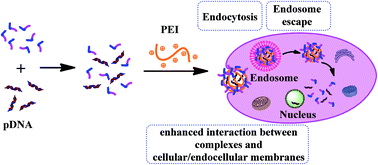Evaluation of the effects of amphiphilic oligomers in PEI based ternary complexes on the improvement of pDNA delivery†
Abstract
Two kinds of novel oligomers were prepared by reversible addition fragmentation chain transfer (RAFT) polymerization and incorporated into the polyethyleneimine (PEI) gene delivery system through non-electrostatic assembly to improve gene transfection efficiency. The non-electrostatic assembly process was first investigated via probing the interactions of the oligomers with plasmid DNA (pDNA), PEI and AD-293 cells using a quartz crystal microbalance (QCM). The results show that the prepared oligomers almost had no interaction with pDNA while they had much stronger interactions with PEI and AD-293 cells. Meanwhile, we found that the two kinds of oligomers had different interactions with AD-193 cells, which caused different effects on gene transfection. The data of QCM tests combined with the in vitro transfection results can be used to explain what effects the oligomers have on improving gene transfection. The results also indicate that the strategy of detecting the interactions of oligomers with pDNA, polycations and cells will contribute to predetermine whether the prepared oligomer is efficient in improving gene transfection.


 Please wait while we load your content...
Please wait while we load your content...